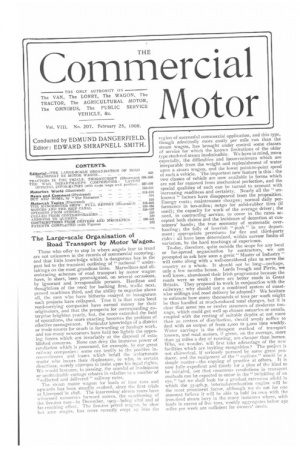The Large-scale Organisation of Road Transport by Motor Wagon.
Page 1

If you've noticed an error in this article please click here to report it so we can fix it.
Those who offer to step in where angels fear to tread are not unknown in the records of commercial motoring, and that little knowledge which is dangerous has in the past led to the transient outlining of " national " undertakings on the most grandiose lines. Marvellous and allembracing schemes of road transport by motor wagon have, in short, been promulgated, on several occasions, by ignorant and irresponsible persons. Heedless and thoughtless of the need for backing first, traffic next, proved machines third, and the ability to organise above all, the men who have hitherto essayed to inaugurate such projects have collapsed. True it is that some local road-carrying companies have earned money for their originators, and that the prospects for corresponding enterprise brighten yearly, but, the more extended the field of operations, the more exacting becomes the problem of effective management. • Particular knowledge of a district or trade counts for much in forwarding or haulage work, and too many newcomers have held too lightly the opposing forces which are invariably at the disposal of established concerns. None can deny the immense power of retaliation which is possessed, for example, by our great railway companies: some can testify to the positive inconveniences and losses which befall the unfortunate trader who incurs their displeasure, or who, in certain directions, merely attempts to insist upon his legal rights. We would instance, in passing, the scandal of inadequate or unobtainable cartage rebates in relation to a number of "collected and delivered " railway rates.
The steam motor wagon for loads of four tons and upwards has been steadily evolved, since the first trials at Liverpool in 1898. The intervening eleven years have witnessed numerous forward moves, the sanctioning of the five-ton tare—in December, 1903—being vital and of far-reaching effect. The five-ton petrol wagon, by slow but sure stages, has more recently crept up into the
region of successful commercial application, and this type, though admittedly more costly per mile run than the steam wagon, has brought under control some classes of service for which the known limitations of the older type rendered steam inadmissible. We have in mind, more especially, the difficulties and inconveniences which are inseparable from the weight and replenishment of water upon a steam wagon, and the lower point-to-point speed of such a vehicle. The important new feature is this : the two classes of vehicle are now available in forms which are not far removed from mechanical perfection, and the special qualities of each can be turned to account with increasing readiness and certainty. Nearly all the " unknown" factors have disappeared from the proposition. Energy costs ; maintenance charges; normal daily performance in ton-miles; outgo for solid-rubber tires (if used); the capacity for work of the average driver; the need, in contracting service, to cover in the rates accepted both claims and the incidence of detention at customers' hands; the true economy of systematic overhauling; the folly of feverish "push " in any department; appropriate premiums for fire and third-party risks : all have been determined, within narrow limits of variation, by the hard teachings of experience.
To-day, therefore, quite outside the scope for any local or far-spread organisation by contractors, we are prompted to ask how soon a great" Master of Industry" will come along with a well-considered plan to serve the country as a whole. It should not be long—perhaps, only a few months hence. Lords Iveagh and Ph-re, we well know, abandoned their Irish programme because the roads were so weak : there are better roads in Great Britain. They proposed to work in conjunction with the railways : why should not a combined system of coastwise sailings and road delivery be adopted? We hesitate to estimate how many thousands of tons per week might be thus handled at much-reduced total charges, but it is clear that some ten or twelve steamers of moderate tonnage, which could get well up chosen estuaries or canals, coupled with the renting of suitable depots at not more than 20 centres of distribution, should amply suffice to deal with an output of from 2,000 to 5,000 tons weekly. Water carriage is the cheapest method of transport known, and road motors, if given, on the average, more than 35 miles a day of running, are cheaper than horses. Who, we wonder, will first take advantage of the new facilities which are inviting recognition? The project is not chimerical, if seriously pursued by some great producer, and the equipment of the " stations " would be a simple matter—the copying of practice at others. It is now fully expedient and timely for a plan of the kind to be initiated, not that enormous revolutions in transport methods can be expected to occur in the" twinkling of an eye," but we shall look for a gradual extension afield in which the 35-4oh.p, internal-combustion engine will be the most prominent factor, although we do not for one moment believe it will be able to hold its own with the iron-tired steam lorry in the many instances where, with loads in excess of five tons, weekly aggregates below 250 miles per week are sufficient for owners' needs.






























